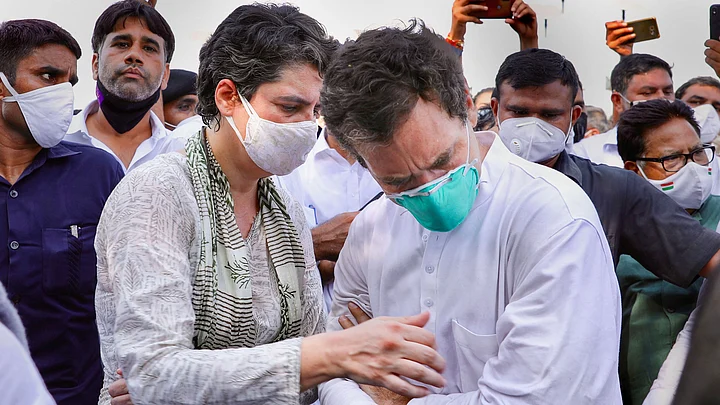When it couldn’t get much worse ... it gets much, much worse. Congress has become wearily accustomed to election wipe-outs. But take a look at the latest tally: just two seats in the Uttar Pradesh State assembly, an emphatic eviction from power in Punjab that even the Congress state chief seems to regard as entirely deserved, and defeat in all five states that went to the polls. That really is the abyss.
The anti-incumbency factor, which is supposed to mean that sooner or later, Congress will bounce back, simply isn’t happening. The Aam Aadmi Party (AAP) will now have as many chief ministers across India as the Congress. Just one person in ten is represented by a Congress MP in the Lok Sabha.
The Wave of Right-Wing Populism
There is a worldwide crisis in social democracy. But that crisis is arguably more profound in India than in any other major democracy with a social democratic tradition, with the sole exception of France. The outlook is not uniformly bleak. After all, there is a Democrat in the White House and a Social Democrat serving as Germany’s Chancellor – though neither has as yet really established their political dominance. But the wave of right-wing populism so evident in the US, Britain, India and Brazil still has the breeze in its sails.
Congress was not at first a social democratic movement – in the 1880s that would have meant Marxist hard left – but an alliance of liberal, nationalist-minded forces. It spearheaded the freedom movement, and after independence, it was so broad that for many years, only the Communists on the left and the Swatantra Party and Jan Sangh on the right could escape its shadow and achieve a measure of electoral success.
But the party of ‘Garibi Hatao’ was unmistakably on the progressive side of the political spectrum – and with the rise of the clearly right-of-centre BJP, the Congress has at the national level been the centre-left counterpoint, advocating secularism, social justice, broader welfare programmes and the rights of minority communities.
The Congress is not the only nationalist movement that has found difficulty in sustaining itself once the primary goal of nationhood has been achieved. Take the example of the African National Congress in South Africa: it’s to the left of the Indian National Congress (there are Communist ministers in South Africa’s ANC-led government) and its achievement of a full non-racial democracy is much more recent. But it has also been tarnished by corruption scandals and nepotism and undermined by a lack of ideological moorings. The populist challenge to the ANC comes from the left, and particularly from Julius Malema’s Economic Freedom Fighters, which has so far failed to get its nationwide vote tally much over 10%.
Rahul's Leadership Has Failed
A comparison with the British Labour Party is more instructive. Congress loyalists – there are still a few – will point out that Labour has been out of power for 12 years and has lost four successive general elections, while Congress has spent only eight years in opposition and suffered two nationwide poll defeats. But Labour now presents itself as a convincing potential party of government. It’s ahead in the opinion polls and has a leader who – again according to the opinion polls – is currently seen as a better option as prime minister than Boris Johnson. The pendulum is swinging towards the left in Britain in a way that simply isn’t evident in India.
Leadership is a large part of that. Keir Starmer, in his two years at the helm, has put his stamp on the Labour Party, moved it away from a hardline socialist stand towards something more centrist and consensual and convinced the electorate that he’s a politician of integrity and ability.
Rahul Gandhi also has decency and integrity, but his leadership has failed. Not just once, but repeatedly. And he comes across as a half-hearted politician, which, a bit like a half-hearted opening bat, is a recipe for disaster. You can’t rally a party and a country behind a standard bearer who gives the impression that he’d rather be somewhere else.
Congress's Own Internal System
And the abysmal result in Uttar Pradesh should underline that Priyanka Gandhi is not the Congress lost leader who will respond to the clarion call and lead her party workers to the promised land. She, too, is a busted flush when it comes to politics.
Social democracy is all about – does it need to be said? – democracy, not simply as a commitment to ‘demos’, to the people, or as a system of governance but as a practice within the party. The Congress has failed to live up to that standard. And the only conceivable (though flawed) justification for preferring dynasty over internal democracy is that the family wins elections. But they don’t anymore.
In political terms, the Congress is a bed-blocker, taking up the space that others might use to greater potential benefit.
The Gandhi clan might point out that when the family loosens their grasp on the reins of power, Congress veers off course (anyone remember Sitaram Kesri?), and that without the family, Congress will fall apart. Perhaps. But out of the embers of a non-dynastic Congress, an effective centre-left party could still be reborn. And even if that’s wishful thinking, the mouldering carcass of the Congress party doesn’t allow the space for any new nationwide social democratic movement to emerge.
(Andrew Whitehead is a former BBC India Correspondent. This is an opinion article and the views expressed are the author's own. The Quint neither endorses nor is responsible for them.)
